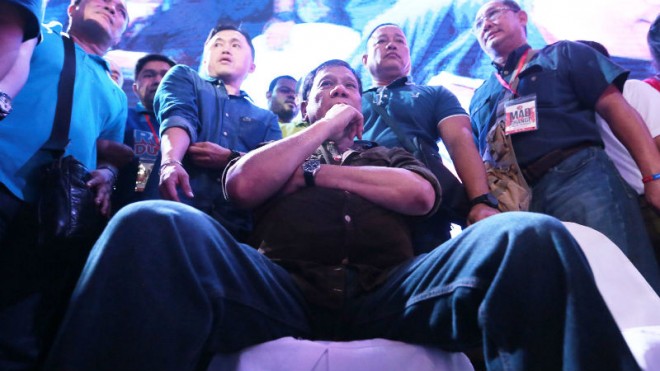Bishop hits Duterte for thinking, acting like God

STRONG LEADER Presidential candidate and Davao City Mayor Rodrigo Duterte strikes a pose during the MAD for Change concert at McKinley West Open Field in Taguig City on Sunday night. GRIG C. MONTEGRANDE
“THERE is a whale of a difference between being righteous and thinking and acting like God.”
This was the reaction of Archbishop Emeritus Oscar Cruz to boasts by Davao City Mayor Rodrigo Duterte, at the formal launch of his presidential campaign Monday, of his being a womanizer and of his no-nonsense campaign against criminals and drug dealers.
Cruz, a former president of the Catholic Bishops’ Conference of the Philippines, said that the Church teachings against killing and adultery were not “subject to personal options.” He told reporters, “Taking justice into one’s hands makes one think like God and act like a dictator.”
Independent senatorial candidate Walden Bello likened a Duterte election in next year’s balloting as the “second coming of the Marcos regime with its disregard for basic human rights.”
“I think Duterte is really dangerous, and I find his views on human rights appalling. But we cannot simply dismiss him. My sense is that his popularity comes from the widespread perception that law and order are breaking down,” Bello, former Akbayan lawmaker, said in an online interview Monday.
But with the rising popularity of Duterte as shown by his leading all presidential aspirants in the latest Pulse Asia survey in Metro Manila, any campaign against Duterte would be an “uphill struggle,” according to Bello.
“But we must convince the people that the shortcut Duterte advocates, to bring about order by suspending or disregarding human rights, will bring about a state of arbitrary rule and impunity that would be far worse than what now exists,” Bello said.
President Aquino’s spokesperson, Edwin Lacierda, asked about Duterte’s presidential bid, said “the responsibility of each candidate is to present their platform of government.”
“And citizens should expect more than sound bites from the candidates, a hard-nosed appraisal of what any of them can offer to all of us,” he told Palace reporters.
The New York-based Human Rights Watch has been calling on the government to investigate Duterte’s possible role in alleged summary executions of suspected criminals in Davao City since the late 1980s when he became mayor. Curiously, Davao is considered the safest city in the country.
Bello, a University of the Philippines professor, said Filipinos were becoming desperate amid the widespread lawlessness and criminality.
“Both the middle class and the lower classes are skeptical about the rule of law, since the rich and powerful are seen to be untouchable, while the police are perceived to be the first to violate the law,” Bello said.
“When people are fearful and angry, they tend to gravitate to strong men, to the man on horseback who they think will bring about security, discipline and order,” Bello said.
He blamed Mr. Aquino for the present sorry state of the country’s peace and order. “P-Noy has been seen to be weak and hypocritical on crime and wrongdoing,” Bello said.
A former staunch Aquino ally, Bello cut his ties with the administration in March over what he considered a Malacañang cover-up of the Jan. 25 clash between police commandos and Moro rebels in Mamasapano, Maguindanao province, that left 44 police officers dead.
He disagreed with Mr. Aquino over the Disbursement Acceleration Program (DAP), which the Supreme Court struck down as unconstitutional, and the retention of Agriculture Secretary Proceso Alcala, Agrarian Reform Secretary Virgilio de los Reyes and Budget Secretary Florencio Abad, all of whom he described as “deadweights.”
“(Mr. Aquino) talks about daang matuwid but protects buddies like Abad, whose name has become synonymous with the illegal, scandalous DAP. His support of (former police chief Alan) Purisima to the very end, despite his being indicted by the Ombudsman, also sent the signal that he was not at all concerned with reforming the national police,” he said. With reports from Jerry E. Esplanada